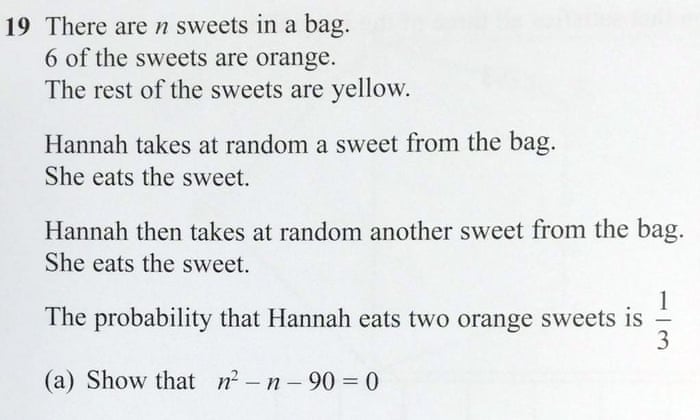Curriculum Tags: All
http://blog.desmos.com/post/122854798480/polygraph-custom-edition
 I kind of like this divisions of fractions representation. The way I see using it is by giving it to students and asking what division question each row represents.
I kind of like this divisions of fractions representation. The way I see using it is by giving it to students and asking what division question each row represents.Curriculum Tags: Gr8
http://www.blog.republicofmath.com/division-of-fractions-davis-pearn/
 And another question from the viral math problem group. This time it's Hannah's Sweets. A nice probability problem that connects to algebra and quadratics. That means it is probably only suitable for grade 12 Data Management but maybe there might be some keeners in the younger grades that could do it without the algebra. Check out @alexbellos post about it below and the solution is also below (but don't cheat).
And another question from the viral math problem group. This time it's Hannah's Sweets. A nice probability problem that connects to algebra and quadratics. That means it is probably only suitable for grade 12 Data Management but maybe there might be some keeners in the younger grades that could do it without the algebra. Check out @alexbellos post about it below and the solution is also below (but don't cheat).Curriculum Tags: MDM4U
http://www.theguardian.com/science/alexs-adventures-in-numberland/2015/jun/05/how-to-solve-the-maths-gcse-question-about-hannahs-sweets-that-went-viral
 Understanding data is so important now more than ever. We are generating more data now than we ever have. So the folks at the Five Thirty Eight blog have started a new podcast: What's the Point. On it they discuss the good, the bad and the ugly about "big data". So far they only have a few episodes but in them they talk about the importance of Data (Ep 0 - with Nate Silver), using data in science (Ep 2 - with Neil Degrass Tyson) and how New York City has used data to their advantage (Ep 3)
Understanding data is so important now more than ever. We are generating more data now than we ever have. So the folks at the Five Thirty Eight blog have started a new podcast: What's the Point. On it they discuss the good, the bad and the ugly about "big data". So far they only have a few episodes but in them they talk about the importance of Data (Ep 0 - with Nate Silver), using data in science (Ep 2 - with Neil Degrass Tyson) and how New York City has used data to their advantage (Ep 3)Curriculum Tags: Gr7, Gr8, MBF3C, MDM4U, MAP4C
http://fivethirtyeight.com/datalab/introducing-fivethirtyeight-newest-podcast-whats-the-point/
 What makes human drummers different from machines? Apparently the answer is fractals
What makes human drummers different from machines? Apparently the answer is fractalsCurriculum Tags: All
http://mentalfloss.com/article/65703/what-differentiates-human-drummers-machines-fractals
 Using less traditional methods, in this Oshawa school they are seeing test scores rise.
Using less traditional methods, in this Oshawa school they are seeing test scores rise.Curriculum Tags: All
http://www.durhamregion.com/news-story/5679762-math-program-created-by-pereyma-high-school-teachers-adds-up-to-big-changes-on-test-scores-in-oshawa/
 And to finish of a "somewhat" balanced article on the benefits of discovery vs drill and kill. It seems this University of Winnipeg prof is always saying to drill them is the best. And it is funny that her headlines come from saying discovery is the problem for lower math scores but then quietly says that she has no proof of this. Some nice stuff from Dan Meyer and Cathy Bruce here on the discovery side as well.
And to finish of a "somewhat" balanced article on the benefits of discovery vs drill and kill. It seems this University of Winnipeg prof is always saying to drill them is the best. And it is funny that her headlines come from saying discovery is the problem for lower math scores but then quietly says that she has no proof of this. Some nice stuff from Dan Meyer and Cathy Bruce here on the discovery side as well.Curriculum Tags: All
https://ca.news.yahoo.com/old-school-math-teachers-debate-best-methods-scores-080010219.html
Another nice one for probability is this TED-Ed video on a simple probability game with dice. I love that the answer is counter intuitive. But this would be a good lesson when talking about fair games and depending on how you handle the math could be done in grades as low as seven and up to twelve. And don't forget that on the TED-Ed site there are follow up questions and teacher resources to go along with the video. Thanks to Mike Lieff for this one.
Curriculum Tags: Gr7, Gr8, MBF3C, MDM4U
http://ed.ted.com/lessons/the-last-banana-a-thought-experiment-in-probability-leonardo-barichello
This is cool (and creepy). This abandoned Ferris Wheel just continues to spin on its own from the wind. You could easily model a nice trig functions problem off of it. Thanks to Xui Bai Li for this one
Curriculum Tags: MCR3U, MHF4U
https://www.youtube.com/watch?v=n3Hj0Z23qys
If you are talking about surface area then this might be a neat little clip to show. The Mythbusters attacked the "It went over like a lead balloon" saying by making a balloon from lead and showing that it will float. Thanks to Jake Parlette for this one
Curriculum Tags: Gr7, MPM1D, MFM1P, MBF3C,
https://www.youtube.com/watch?v=HZSkM-QEeUg
Here is a neat idea to promote using a protractor in your classrooms
Curriculum Tags: All
https://twitter.com/TheHeadKnuckle/status/616804469997719552/photo/1








No comments:
Post a Comment